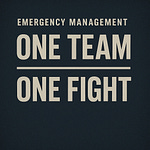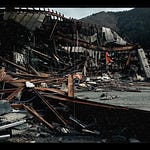The Importance of Self-reflection in Emergency Management: A Thoreau and Sartrean Perspective

I had a great conversation with a few of my colleagues about why we chose the field of emergency management. As the night went on, we discussed how we have seen "the great burnout" of emergency management professionals over the last few years.
Our profession is not the only one that is suffering. There has been the "Great Resignation" and the "Quite Quitting" that has been occurring since COVID. People are looking for a better work-life balance.
We all know, and it may even be you, that person who hates their job but refuses to leave. They have many reasons to stay in a position that does not give them satisfaction, only a paycheck. There has to be more…
There are two areas we should consider when discussing job satisfaction and life balance. What do we get from the job (satisfaction, pay, position, prestige), and how do we balance our lives (family time, alone time, able to work on passion projects)?
So, Let's start with Henry David Thoreau.
He has been commonly, yet inaccurately, labeled as a lazy and idle individual, often associated with being a tree-hugging, work-shy, and early hippie. In reality, Thoreau was a job-hopper who challenged the traditional notions of work and its relationship to personal fulfillment.
Thoreau's career trajectory began in 1837 when he graduated from Harvard and entered the workforce during a financial crisis. This crisis, also known as the Panic of 1837, triggered a significant economic downturn, resulting in a decline in profits, prices, and wages.
Upon returning home to Concord, Massachusetts, Thoreau struggled to secure employment due to the scarcity of job opportunities. He eventually landed a teaching position but ultimately resigned due to his opposition to corporal punishment, which he deemed harmful to the students.
Thoreau's resignation from his teaching position reflected his values and principles, as he refused to compromise his beliefs and inflict harm on children. Thoreau's decision to quit his job can be seen as courageous, as he was willing to sacrifice job security for his morals and conscience.
Thoreau's actions challenged the conventional idea that work should take precedence over personal values and beliefs and that one should prioritize financial stability over personal integrity.
Henry David Thoreau's resignation as a schoolteacher in 1841 has been interpreted as a symbolic rejection of the emerging industrial economy and a return to the artisanal values of self-sufficiency and independence.
Thoreau's Resignation:
Now look deeper at Thoreau's resignation from his position as a schoolteacher.
He wrote about his dissatisfaction with the traditional educational system and desire for a more meaningful and self-directed life. His resignation was also motivated by his opposition to slavery, which he believed was supported by the time's economic system.
Thoreau, with a new way of looking at education, teamed up with his brother John to open a private academy or "alternative school." The brothers Thoreau allowed students thirty minutes of recess, rather than the traditional ten; they took field trips with vocational aspects.
They surveyed the school grounds and planted crops with the students, who learned basic mathematics and science. And they took numerous journeys to outdoor sites — hence the term “field trips” — where the students also learned about local history. Unfortunately, the brothers closed their small school due to John's death.
After the school's closing, He landed a few jobs he was unsatisfied with and determined he needed to find a better way of living. So, starting on July 4, 1845, a few days shy of his 28th birthday, Thoreau opted for a life of resignation.
As the nation celebrated Independence Day, Thoreau embraced his own, walking the two miles from Concord to the shores of Walden Pond. He would stay there for two years, two months, and two days.
Thoreau's Resignation and the Artisan Movement:
Thoreau embraced the artisan movement of the mid-19th century.
It was a reaction to the growth of industrialization and the displacement of skilled workers by machines and unskilled labor. Artisans were skilled craftsmen who produced goods by hand and were known for their quality and attention to detail.
The movement was characterized by a desire for independence and self-sufficiency and a commitment to quality over quantity. Thoreau's resignation can be seen as a reflection of the values of the artisan movement.
His rejection of the traditional educational system and his desire for a more meaningful and self-directed life were consistent with the movement's emphasis on independence and self-sufficiency. Thoreau's opposition to slavery can be seen as rejecting the economic system supported by cheap labor, exploitation and wealth accumulation. Artisans often lived and worked in rural areas, and their work was often closely tied to the land and the natural world.
Thoreau's retreat to Walden Pond and his embrace of a simple, self-sufficient lifestyle can be seen as rejecting the urban, industrialized world and returning to a more natural and authentic way of life.
Why does this matter? That is an excellent question because we are all on this trip together, and the field of emergency management is sometimes getting brutal. Some People are here for the wrong reasons, and we are at a crossroads.
Our field involves the coordination of various agencies and stakeholders to mitigate the effects of disasters and emergencies. In this context, the emergency manager plays a vital role in ensuring the safety and well-being of the public.
However, our effectiveness can only be projected if we operate in good faith rather than denying our freedom and responsibility for our choices and actions.
One must be honest about the responsibilities and challenges of emergency management, which is crucial for effective decision-making and public safety, drawing from Jean-Paul Sartre's concept of bad faith.
According to Sartre, bad faith is a state of self-deception in which individuals deny their freedom and responsibility for their choices and actions. This can manifest in various ways, such as denying the existence of alternatives, avoiding difficult decisions, or attributing one's efforts to external factors beyond their control.
In emergency management, being in bad faith would mean denying the reality of one's role and responsibilities as an emergency manager. We are entrusted with the safety and well-being of the public during times of crisis.
By acknowledging our responsibilities and accepting the weight of our decisions, emergency managers can make informed and responsible choices that prioritize the community's needs. Denying one's responsibility as an emergency manager can lead to complacency, irresponsibility, and, ultimately, harm to the public. So, Being honest with oneself about our challenges can help us become resilient, better leaders, and more effective at our jobs.
Emergency management involves making difficult decisions under high-stress situations, and honest self-reflection can help us identify our strengths and weaknesses and areas for improvement. As Emergency managers, we can effectively manage crises and protect the public by acknowledging our limitations and seeking support. By recognizing the weight of our decisions, we can make informed choices that prioritize the community's needs.
One of the critical challenges of emergency management is the unpredictable nature of disasters and emergencies. Despite meticulous planning and preparation, unforeseen events can occur, which require emergency managers to make critical decisions quickly. In such situations, it can be tempting to deny responsibility for the situation's outcome and attribute it to external factors beyond our control.
However, this needs to be revised to the reality that the emergency manager's role in protecting the public can lead to complacency and irresponsibility.
Honesty about one's limitations and weaknesses is essential for effective emergency management. Emergency managers must be able to identify their strengths and weaknesses. Acknowledging one's limitations and asking for help shows strength and responsible leadership.
One must recognize one's flaws to ensure adequate preparation and effective decision-making. Emergency management requires honesty and self-reflection.
The importance of self-reflection in emergency management cannot be overstated. Through the lens of Henry David Thoreau and Jean-Paul Sartre, we have explored the significance of introspection and personal integrity in this field.
Thoreau's resignation from his teaching position and his embrace of a simple, self-sufficient lifestyle reflected his refusal to compromise his values and prioritize personal fulfillment over societal expectations.
Sartre's concept of bad faith warns against denying one's freedom and responsibility as an emergency manager, emphasizing the need for honest self-assessment and decision-making.
By self-reflection, emergency managers can better understand our motivations, values, and limitations. This introspection enables us to make informed and responsible choices prioritizing the public's well-being.
Acknowledging emergency management challenges and seeking support is vital for effective crisis management. Being honest about one's weaknesses and limitations fosters personal growth and continuous improvement in the field.
In a time when many professionals are experiencing burnout and seeking a better work-life balance, self-reflection becomes even more critical. By examining what we derive satisfaction from in our work and how we can achieve a harmonious balance in our lives, we can make deliberate choices that align with our values and well-being.
This benefits individuals and contributes to a healthier, more resilient emergency management profession. Self-reflection is an ongoing process that requires dedication and willingness to confront uncomfortable truths.
As we strive to enhance the field of emergency management, let us embrace the power of self-reflection, cultivate personal integrity, and prioritize the well-being of ourselves and the communities we serve.
Together, we can build a more resilient and compassionate future in emergency management.
Supporters













Share this post